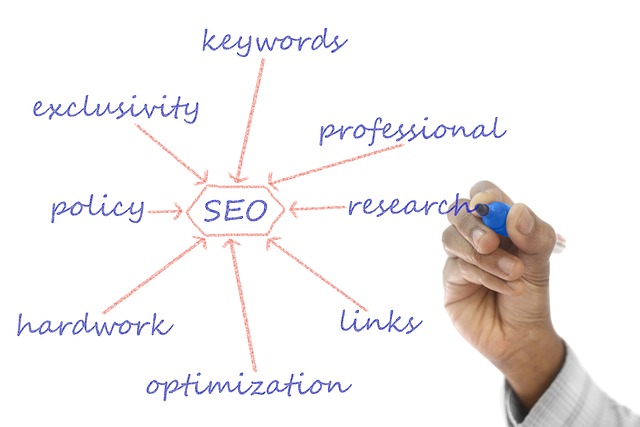Advanced Keyword Research (AKR) is a strategic method that organizes related keywords into themed groups based on user intent and semantic relationships, enhancing content strategies, user experience, and search engine rankings. Using tools like Google Ads Keyword Planner, SEMrush, and Ahrefs, professionals navigate complex term networks, uncovering hidden patterns and creating meaningful clusters aligned with user behavior. This approach improves SEO performance, site navigation, and engagement, as demonstrated by e-commerce platforms like a leading organic beauty seller. Neglecting AKR can lead to broad, generic keywords and missing out on valuable insights, so staying ahead of trends using AI-powered tools is crucial for success in the digital landscape.
“Unleash the power of strategic keyword clustering to elevate your content strategy. This comprehensive guide explores the art and science behind organizing search terms into cohesive themes, enhancing SEO performance. From understanding the fundamentals to leveraging advanced research techniques, we delve into effective cluster development. Discover how tool-assisted analysis simplifies the process, enabling you to create meaningful groups that optimize search presence. Explore real-world case studies, learn from common mistakes, and stay ahead with future trends in keyword cluster management.”
Understanding Keyword Clustering: A Comprehensive Overview

Keyword clustering is a powerful strategy in advanced keyword research that involves grouping related keywords together based on shared themes and user intent. It’s a methodical approach to organizing vast amounts of data, allowing for a deeper understanding of user search behavior and content optimization. By identifying clusters, marketers can create more focused and relevant content, improving user experience and boosting search engine rankings.
This technique goes beyond simple keyword matching by considering semantic relationships and contextual relevance. It involves analyzing the underlying themes and topics that connect keywords, enabling a more nuanced view of customer needs. Through advanced research techniques, businesses can uncover hidden patterns and insights, ensuring their content strategy aligns with user expectations and search trends.
The Role of Advanced Keyword Research in Content Strategy

In today’s digital landscape, a robust content strategy is pivotal for any brand or business aiming to thrive online. At the heart of this strategy lies advanced keyword research, which serves as a compass guiding content creation efforts. By delving into intricate keyword clustering strategies, marketers can uncover valuable insights and tailor their content to accurately reflect user search intent. This involves identifying long-tail keywords, understanding searcher behavior, and analyzing competitors’ strategies to stay ahead in the ever-evolving digital space.
Advanced Keyword Research empowers businesses to make data-driven decisions. It enables them to cluster related keywords into thematic groups, ensuring that content is not only optimized for search engines but also offers genuine value to audiences. This strategic approach goes beyond mere keyword stuffing; it focuses on creating a rich and diverse vocabulary that reflects the depth of information your brand provides. Ultimately, this ensures that your content resonates with its intended audience, driving engagement, and boosting online visibility.
Identifying Relevant Themes and Topics for Cluster Development

Identifying relevant themes and topics is a crucial step in keyword clustering strategies, especially for those employing advanced keyword research techniques. This involves delving into the data to uncover hidden patterns and insights that reflect user search intent. Through meticulous analysis, researchers can isolate specific concepts within a broader subject matter, ensuring clusters are both distinct and meaningful.
Advanced Keyword Research tools empower professionals to navigate complex landscapes of related terms, synonyms, and semantically connected ideas. By leveraging these resources, cluster development becomes more precise and aligned with the natural language preferences of users. This strategic approach guarantees that each cluster represents a coherent group of keywords sharing similar contextual associations, ultimately enhancing content organization and search engine optimization (SEO) performance.
Utilizing Tool-Assisted Analysis for Efficient Clustering

In today’s digital era, advanced keyword research is a powerful tool that facilitates efficient keyword clustering strategies. By employing sophisticated algorithms and data analytics, tools like Google Ads Keyword Planner, SEMrush, and Ahrefs enable professionals to uncover intricate relationships between keywords and their underlying themes. This allows for the creation of well-structured clusters that accurately represent search intent and user behavior.
Tool-assisted analysis streamlines the process by automating repetitive tasks, such as volume analysis and competition assessment, freeing up valuable time for more strategic considerations. Additionally, these tools provide insights into long-tail keywords and trending topics, enabling marketers to stay ahead of the curve and adapt their content strategies accordingly. As a result, efficient clustering enhances SEO performance, improves user experience, and ultimately drives better conversion rates.
Creating Meaningful Clusters: Grouping Keywords Strategically

Creating meaningful clusters involves a strategic approach to grouping keywords, which is a critical step in advanced keyword research. It’s not merely about gathering words under broad topics; instead, it entails understanding semantic relationships and user intent. Each cluster should represent a distinct concept or theme, reflecting how users might search for related information. By organizing keywords this way, you enhance the efficiency of your content strategy.
For instance, if your main topic is “digital marketing,” clusters could include “SEO strategies,” “social media advertising,” and “content creation.” This grouping allows for more focused and targeted content development, ensuring that each piece addresses a specific aspect of digital marketing effectively. Advanced keyword research techniques, such as analyzing competition and user search behavior, can guide this process, ultimately leading to better-structured and more relevant content clusters.
Optimizing Search Presence through Well-Organized Clusters

Well-organized keyword clusters can significantly optimize a website’s search presence, making it easier for target audiences to find relevant content. By grouping related keywords together and strategically placing them throughout a site’s architecture, businesses can enhance their visibility on search engines. This approach ensures that both users and algorithms can navigate the site intuitively, understanding its content structure and hierarchy.
Advanced Keyword Research plays a pivotal role here, identifying not just popular but also long-tail keywords specific to each cluster. Such precision enables websites to cater to niche audiences, increasing the likelihood of ranking higher for relevant search queries. Moreover, organized clusters facilitate better internal linking, where pages within a cluster link to one another, passing along authority and improving overall SEO performance.
Case Study: Effective Keyword Clustering in Action

In the realm of digital marketing, successful content strategy hinges on profound understanding and effective clustering of keywords. Consider a leading e-commerce platform that sells organic beauty products. Through advanced keyword research, they identified three main clusters: “natural skincare ingredients,” “home spa treatments,” and “eco-friendly beauty brands.” This strategic clustering allowed them to create targeted content for each cluster, appealing to specific customer segments. For instance, the “natural skincare ingredients” cluster attracts conscious consumers interested in understanding product components, while “home spa treatments” caters to those seeking DIY solutions.
This case study exemplifies how keyword clustering can enhance user experience and search engine optimization (SEO). By organizing content into distinct clusters, the platform improves discoverability, increases engagement, and drives conversions. Moreover, advanced keyword research enables dynamic adjustments based on market trends and customer behavior, ensuring the platform remains a trusted source of information and products in the competitive digital landscape.
Common Pitfalls to Avoid During the Clustering Process

Many businesses and marketers often underestimate the significance of thorough keyword research before implementing clustering strategies. This can lead to several common pitfalls during the clustering process, ultimately impacting the effectiveness of content creation and SEO efforts. One major issue is using broad or generic keywords that lack specificity. Such keywords may attract a vast audience but fail to target a specific customer segment, diluting your marketing message.
Another trap to avoid is neglecting competitor analysis. Understanding how competitors utilize keywords can provide valuable insights into industry trends and consumer behavior. Ignoring this aspect might result in missing out on relevant keywords or creating content that does not stand out in a crowded digital landscape. Advanced keyword research involves delving into long-tail keywords, user intent, and competitor strategies to avoid these pitfalls and ensure a more successful clustering process.
Future Trends and Innovations in Keyword Cluster Management

As technology continues to evolve, so does the landscape of keyword clustering and search engine optimization (SEO). The future of keyword cluster management is set to be revolutionized by advanced keyword research techniques. By leveraging artificial intelligence and machine learning algorithms, marketers can now uncover hidden semantic relationships and long-tail keywords that were previously difficult to identify. This allows for a more nuanced understanding of user intent and enables the creation of highly targeted content clusters.
Innovations in natural language processing (NLP) will play a pivotal role in shaping these trends. NLP tools are becoming increasingly sophisticated, enabling automated topic modeling and sentiment analysis. These technologies can analyze vast amounts of data to identify emerging patterns, predict search trends, and dynamically adjust keyword strategies. With real-time insights into user behavior and preferences, marketers can stay ahead of the curve, ensuring their content remains relevant and optimized for future search algorithms.
